Guangzhou is the first city to address the proliferation of electric bicycles. Can the strictest new regulations cope with the out-of-control "electric chickens"?
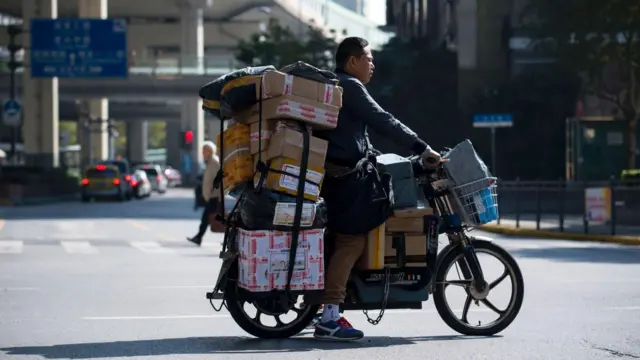
- Yu Meixia
- BBC Chinese reporter in English
After living in Guangzhou for eight years and driving a car for four years, Pan Yong finally couldn't resist and bought an electric bicycle in June this year. He is 32 years old and a software engineer. Now he rides an electric bicycle to and from work, and occasionally when he goes to a restaurant for dinner, he and his wife will put their two-year-old daughter in the middle and drive over.
"It's very convenient. Except when it rains, there are only advantages and no disadvantages." Pan Yong praised the advantages of electric bicycles: fast speed, no need to get stuck in traffic, and saving money - he has carefully calculated that an electric bicycle costs less than 3,000 yuan, and after deducting the fuel and parking fees he usually spends on driving a car, "the investment can be recovered in half a year."
Guangzhou residents call electric bicycles "electric chickens". Some say they make a sound like a rooster crowing, while others say the "chicken" feels small and flexible. Pan Yong is just one of the 5.6 million people who use them for commuting, shopping, and entertainment.
According to Guangzhou government data, by 2024, the number of registered electric bicycles in the city has exceeded 5.6 million, and continues to soar at a rate of about 100,000 per month. In 2023, Guangzhou's permanent population will be 18.827 million, which means that on average less than four people will own an "electric chicken".
There is no need to take a driver's license for electric bicycles, as long as they are registered, they can be used on the road. In the past few years, it has become one of the main causes of traffic chaos in Guangzhou: illegal modification, speeding, running red lights, illegal parking and even driving on the sidewalk - people jokingly say that Guangzhou is now "surrounded by electric chickens." Pan Yong also said embarrassedly that he occasionally runs red lights, "I just drive past when I see no cars."
The chaotic market situation has become an urgent problem for the government to solve. On December 30, Guangzhou took the lead in China to implement strict restrictions on electric bicycles, including increasing fines for violators and limiting the speed to 15 kilometers, which is called the "strictest in history." However, almost all citizens interviewed by BBC Chinese expressed pessimism about the subsequent results: "No matter what new regulations you come up with, it's useless. The problem is that they didn't manage it properly when it happened, and they didn't manage it until it was rampant, which basically made it out of control."
More than a decade after the ban on motorcycles, the "electric chicken siege"
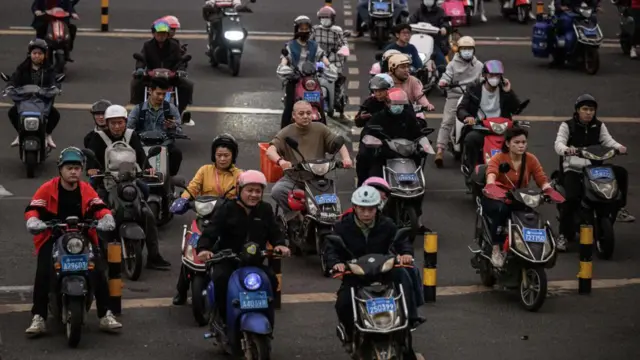
Guazi (pseudonym), 25, was born in Guangzhou and currently works in Guangzhou. She also travels to other places on business. Every time she goes home, she is very dissatisfied with the random parking, storage and driving of electric bicycles. "They have a great impact on my daily life."
Since there are few dedicated parking spaces for electric bicycles around urban roads, people can easily park them anywhere, squeezing the sidewalk space. Guazi's daily commute is mainly by bus, but she said that electric bicycles almost completely block the roads around the bus station, and people waiting for the bus cannot enter the station to wait for the bus. She also has a disabled person in her family, and not only is it greatly affected when she goes out on the street in a wheelchair, but sometimes when she accompanies her family members who use crutches, electric bicycles will keep honking their horns on the sidewalk and accusing them of not giving way.
Guazi said angrily that the chaos is not limited to any region. "No district in Guangzhou is doing well now. Even the CBD of Zhujiang New Town cannot stop the army of electric chickens," she lamented. "In the past, parents were very relieved when primary and secondary school students went out to play during holidays. Now my cousins dare not let them do that."
In fact, before the proliferation of "electric chickens", Guangzhou was also "chaotic".
In the 1980s, as the city developed, people's economic ability improved, but many urban villages remained in Guangzhou. Motorcycles were fast and cheap, and became people's means of transportation in the narrow streets and alleys of various urban villages. However, motorcycles gradually spawned many robberies and crimes, and the noise and exhaust pollution problems were repeatedly criticized. Therefore, starting in the 1990s, major cities in China began to ban motorcycles. Guangzhou became the second first-tier city in China to ban motorcycles after Beijing in 2007.
Mr. Mao (pseudonym), who is in his early 30s, was born and raised in Guangzhou. He remembers that the one-size-fits-all ban on motorcycles affected many people's travel, but the pain of change soon passed. In the following years, Guangzhou vigorously developed public transportation such as subways and buses, which he described as "very well done", and "everyone forgot about motorcycles."
In fact, Guangzhou also issued a ban on electric bicycles in 2006, a year before the ban on motorcycles. However, at that time, few people in the delivery industry, such as takeout and express delivery, used them. As for the sudden surge in the number of electric bicycles, Mr. Mao felt that it started with the 2020 COVID-19 pandemic.
At that time, cities in China implemented strict management to restrict citizens from gathering and traveling. "Everyone avoided gathering and took the subway less, but when they needed to go to some distant places, bicycles were not fast enough and taxis were not often used," people found that electric bicycles were a convenient tool, "They were fast, they only cost a few thousand yuan, and they didn't need to find a place to park."
Electric bicycles, with an average price of 3,000 yuan, are gradually becoming popular in cities: the elderly ride them to the vegetable market to buy vegetables, blue-collar and white-collar workers also ride them to commute and pick up children. According to Guangzhou's traffic operation data in 2023 , the average daily number of electric bicycle trips is 6.85 million, an increase of 72% over 2019; it is the third largest mode of transportation for people after walking and private cars.
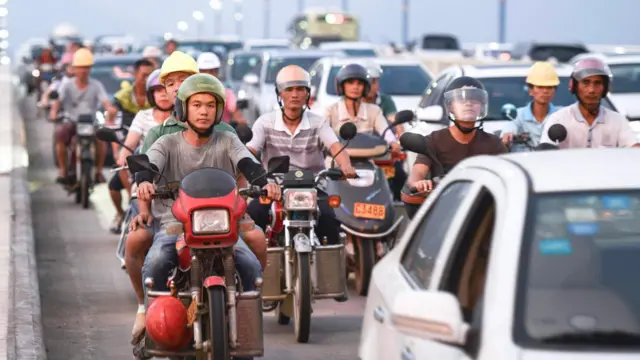
Speeding, driving against traffic and running red lights
The development of emerging industries such as takeout and online shopping, coupled with changes in citizens' lifestyles, have driven the electric bicycle craze, but the long-term lack of supervision has led to a host of chaos.
The first is speeding after modification. Electric bicycles and motorcycles have different power systems. According to Chinese national standards, the maximum design speed of electric bicycles shall not exceed 25 kilometers per hour, and the weight shall not exceed 40 kilograms, and they are classified as non-motor vehicles. However, it is very easy to modify electric bicycles to reduce speed.
In June this year, 25-year-old Lao Liping came to Guangzhou to work and soon bought a second-hand electric bicycle. He said that after selling the vehicle, the merchant would not only help to get the license plate, but also help to unscrew it for free or for a small processing fee if the customer requested it. He described it as "as fast as turning a screw." There are also many tutorial videos on the Internet.
Lan Shiyou, president of the Guangdong Electric Vehicle Chamber of Commerce, said that more than half of electric bicycle owners would modify their vehicles. After the deceleration, the speed of the electric bicycle can easily be increased to 45 to 60 kilometers per hour, but the instrument panel still shows the legal 25 kilometers.
The second is the low awareness of traffic laws. Speeds have increased, but people's driving awareness has not kept up - drivers can drive on the road without having to take a driver's license.
Mr. Mao said that there are not many non-motorized vehicle lanes in Guangzhou, and sometimes they are occupied by illegally parked private cars. Some electric bicycle drivers will drive on the motor vehicle lanes, while others choose to drive on the sidewalks. "They may think it is safer for them, or they may think that others will avoid them." He thinks this is a cognitive problem. "But if you are driving a motorcycle and you find a taxi in front of you (blocking the road), your first instinct is not to drive on the sidewalk."
"That's because he has no idea how to use the road," said Zhang Shengxiong, a retired professor of the Department of Transportation Management at Tamkang University. In his opinion, the driver's road safety awareness is related to the driver's license test. He pointed out that in places where the driver's license test is generally strict and cautious, people usually have better traffic safety because they have basic road knowledge.
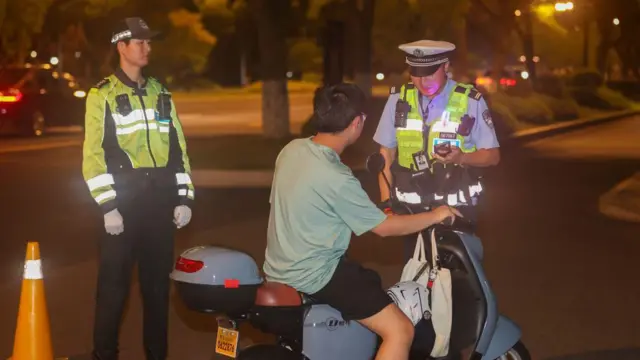
But the situation in Guangzhou is just the opposite. Traffic violations by "electric bicycles" have greatly increased the number of accidents. According to statistics from Southern Metropolis Daily , injuries involving electric bicycle traffic accidents generally account for 60% to 80% of patients in trauma orthopedic departments of major hospitals; Chi Dazhi, deputy chief physician of the emergency department of Zhujiang Hospital, also said that in the first half of this year, nearly 80% of the emergency traffic accidents in the hospital's surgery department involved electric bicycles, with 325 cases.
In fact, in order to reduce the situation, the Guangzhou government began to implement a license plate system for electric bicycles in November 2021, hoping to achieve precise law enforcement. However, it is difficult to implement it in reality. First of all, due to the large number of vehicles, it is difficult for traffic police to fully enforce the law. In addition, many people will deliberately cover the license plate with plastic bags, masks, rags or stickers to avoid recognition by traffic police and electronic surveillance on the road.
In the eyes of drivers, the traffic police's punishment has not achieved a deterrent effect. Lao Liping, who needs to deliver documents to customers in his daily work, confessed that when he drives an electric bicycle, he always goes through tunnels and crosses the river bridge to save time. However, according to regulations, electric bicycles are prohibited from using such roads 24 hours a day.
At present, the fines for traffic violations range from 20 to 50 yuan. Lao Liping said calmly, "It's not high actually. 20 yuan is just the price of a cup of coffee."
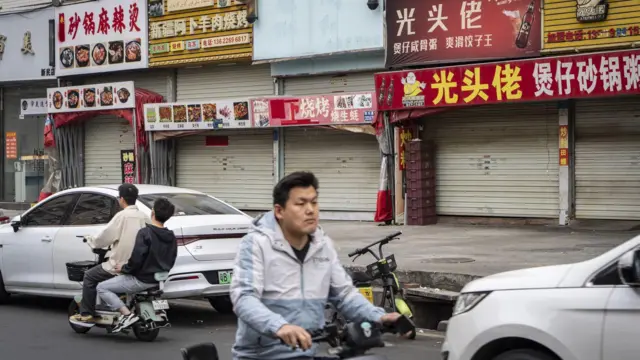
New regulations increase fines and speed limit to 15 kilometers
The new rules came into effect on December 30. Guangzhou's " Electric Bicycle Management Regulations " consists of 8 chapters and 55 articles, mainly targeting traffic violations such as modification, speeding and running red lights, as well as illegal charging and other behaviors, and increasing fines.
Under the new rules, operators who illegally modify an electric bicycle can be fined up to 50,000 yuan; if caught more than three times, they will be fined 100,000 yuan; if caught driving an illegally modified electric bicycle on the road, they will need to restore it to its original state and be fined between 200 yuan and 500 yuan. In addition, if two of the following violations are violated, such as driving against traffic, drunk driving, using a phone, and overtaking and speeding, the public security traffic police will order a warning or a fine of up to 200 yuan.
It is worth noting that the new regulations stipulate that all electric bicycles must not exceed a maximum speed of 15 kilometers per hour when driving in non-motorized vehicle lanes, which is slower than the 25 kilometers per hour designed for the bicycles. This is a huge blow to food delivery workers who believe that "time is money".
On the Chinese social media platform Xiaohongshu, a food delivery man filmed himself driving at 15 kilometers per hour. He described it as like riding a bicycle. Looking at the navigation, it is difficult to make it through the traffic lights in time. He also calculated that it would take 12 minutes to run three kilometers at this speed. If he were working formally, he would have to take into account the time to pick up the food and wait for it. Now many food delivery times are limited to 30 minutes. Unless the delivery platform relaxes the delivery time, it is absolutely impossible to deliver on time.
Zhang Shengxiong believes that Guangzhou's new 15 km speed limit "may not be very reasonable." In Taiwan, the maximum speed of electric bicycles is 25 km/h. "I can ride 12 (kilometers) on my bicycle," he said. Such a move may make people want to modify their bicycles, but more importantly, managers must explain the reasoning behind the restriction.
In fact, the "15 km speed limit" is not a new rule. According to the "China Road Traffic Safety Law", it is stipulated that when motorized wheelchairs and electric bicycles for the disabled are driving in non-motorized vehicle lanes, the maximum speed shall not exceed 15 km.
However, an expert who participated in the formulation of the regulations once told the media that the regulations at that time mainly targeted bicycles and the more popular power-assisted electric bicycles, "which are somewhat different from the popular electric bicycles now." The Road Traffic Safety Law has been revised three times since it was implemented in 2004, but the article on limiting the maximum speed of electric bicycles has never been updated.
Hu Gang, a professor at the School of Public Administration of Jinan University , agreed that speed limits should be imposed on electric bicycles, but he believed that a distinction should be made between vehicles for daily use and vehicles for commercial use. For the latter, "the characteristics of the industry and delivery needs should be comprehensively considered."
In response to this issue, the Guangdong Provincial Public Security Department said that in the first half of 2025, special license plates will be implemented for electric bicycles in industries such as takeout and express delivery. The license plates will be applied for by the company and will only be used by the company's employees. At the same time, the traffic police department will also urge delivery platforms to relax delivery times.
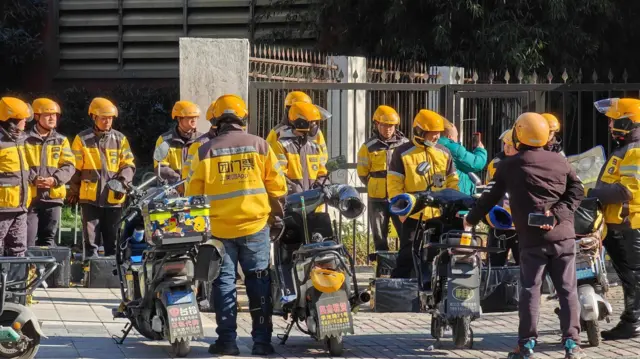
Enlightenment from Taiwan's motorcycle management
Today is the first day of the new regulations. Lao Liping said that his friends sent him videos showing a large number of traffic police guarding key areas and intersections such as Haizhu Bridge, catching exaggeratedly modified and unlicensed electric bicycles. However, the actual effectiveness of the new regulations still needs time to be verified.
However, both Guazi and Lao Liping scoffed at the new regulations.
"In the initial stage, there were no supporting measures to regulate the use of electric chickens on the road. It has become a habit and it is not easy to change it. Even if it needs to be changed, it will require a lot of manpower and material resources. I don't think they have that much money to do it." Guazi said.
After the ban on motorcycles, the market conditions in Guangzhou improved for a time. Is it feasible to follow the ban on electric bikes now? Lao Liping thinks that "one size fits all" is not feasible. He said that at present, electric bikes in Guangzhou are linked to many industries such as batteries and transportation. "If you crack down on these things, it will have a certain impact on the upstream and downstream of this industry."
As for the root cause of the chaos, he thinks it is a problem of human quality, not a problem of the system.
If we look at Taiwan, which is known as the "motorcycle power", can it become a model of successful management? In 2023, the number of motorcycles in Taiwan will reach more than 14.49 million, and almost 6 out of every 10 people will own a motorcycle. However, Chang Sheng-hsiung does not agree that Taiwan has done well.
He pointed out that for a long time in the past, many government officials who had studied in the United States only considered motorcycles to be a transitional tool for coping, and they had been managing motorcycles at a minimum level, "When people have money, motorcycles will be eliminated." It was not until the 1970s that Taiwan began to implement driver's license management for motorcycles.
Chang Sheng-hsiung pointed out that among all countries with a GDP of more than 30,000 US dollars, "Taiwan has the most motorcycles." According to his observation, the main reason is the lack of pedestrian space in urban planning. People often have to walk on the road and compete with other vehicles, which gradually makes some people choose to ride motorcycles and devote themselves to the road.
But in Taiwan, the transportation department thinks from the perspective of cars, and non-motor vehicles have obvious differences from cars in terms of lanes and parking spaces. Cai Yiqiang, deputy director of the road group of the Construction and Planning Agency, once accepted an interview with the media . He described Taiwan's entire road environment as being in an "exceptional state". Due to unclear road planning, cars, motorcycles, and bicycles squeeze each other's space - motorcycles in the fast lane are forced to go to the slow lane, and bicycles in the slow lane have to go to the sidewalk.
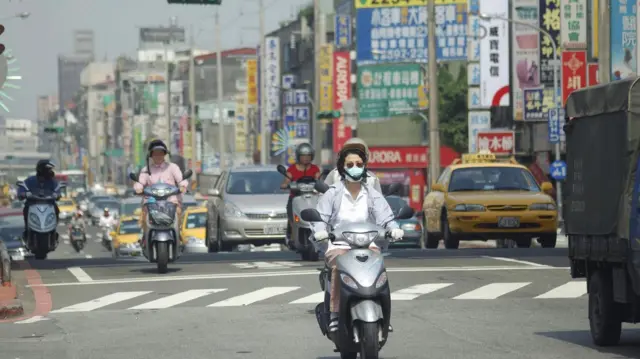
This is also the situation faced by electric bicycle drivers in Guangzhou. After banning motorcycles, Guangzhou vigorously developed public transportation, but did not fully consider the needs of non-motorized vehicles. Non-motorized vehicle lanes account for less than 30% of urban roads, far lower than the levels in Beijing and Shanghai. In addition, the lanes are often occupied by cars, so electric bicycles have to drive out and compete with cars for the road, resulting in various chaos.
Zhang Shengxiong believes that many bad behaviors are caused by unfairness and injustice, and managers should "face it honestly." "If only 1% of people violate the rules, you should enforce the law. If 10% of people violate the rules, you may have to think about it (what's the problem). If 70-80% of people violate the rules, it must be your problem, not the user's problem."
Zhang Shengxiong said that before enforcing the law, managers should clarify the problem from the perspective of "emotion, reason, and law" - first understand the reason why the driver violated the law and whether he knows the law; if he knows the law but violates the law for some convenience or to save time, he should consider whether there is a problem with his own engineering facilities.
He gave an example, a person driving onto a bridge illegally may be because he doesn't want to take a long detour, "These people may be more vulnerable and may be trying to buy some time, so why don't you let them pass? You have to explain it and convince them." Only when both parties understand and the engineering facilities are indeed reasonable and feasible, Zhang Shengxiong believes that the government will have legitimacy and will be supported by the people when enforcing the law at this time.
"People will naturally choose the best way to enter and exit for them. Their current choice is the best choice, so you (managers) must respect the people," he said.
Comments
Post a Comment